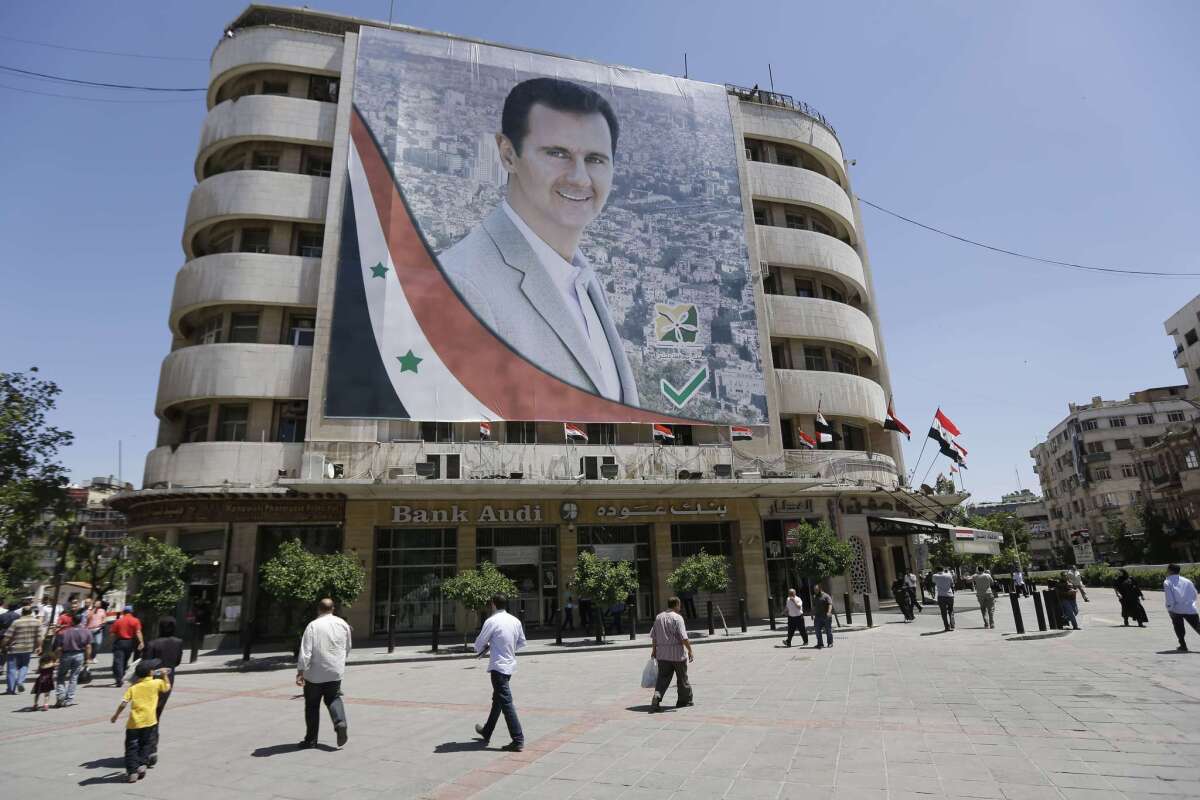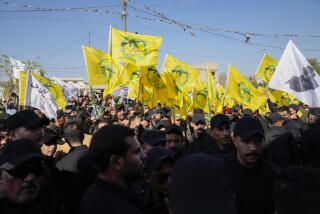Commander’s death in Syria points to Iranian role in civil war

- Share via
Reporting from Beirut — A prominent Iranian military figure has been killed while fighting in Syria, according to both Syrian opposition and Iranian government sources, adding to mounting evidence of Tehran’s military assistance to Syrian President Bashar Assad.
Abdollah Eskandari, a retired senior commander in the Iranian Revolutionary Guards Corps (IRGC), was “martyred” last Monday in fighting just south of Damascus, according to a statement released by the Iranian Defense Ministry. The statement was made during a memorial ceremony for the commander in Shiraz.
Syria’s pro-opposition Tahrir Souri website posted grisly images that showed a young rebel fighter proudly holding what was purported to be Eskandari’s mutilated head on a stake, coupled with other photos of a bruised and bloody headless corpse.
There was no mention of where and when the photographs were taken, and their veracity could not be independently confirmed. Related images on pro-opposition Facebook pages claimed that Eskandari was killed in the Hama countryside, slightly more than 100 miles north of Damascus.
Eskandari’s death brings the number of Iranian officers killed in Syria to 60, according to Syrian opposition sources. The Iranian government, a staunch supporter of the Assad regime, has nevertheless steadfastly maintained that its military presence has been limited to on-the-ground advisors to help the Syrian government combat “terrorism” and providing training to the National Defense Force — a civilian body akin to an armed neighborhood watch program.
The Assad government routinely describes the activities of the opposition as terrorism. The Syrian opposition and government are locked in a three-year conflict that has left, according to some sources, more than 160,000 dead.
As recently as last Sunday, the state-run Fars News Agency quoted Iranian Deputy Foreign Minister Hossein Amir Abdollahian as saying that “not even a single Iranian fighter is in Syria.” Iranian Foreign Minister Mohammad Javad Zarif has repeatedly called for a political solution to the crisis.
“The foreign powers should give up the illusion of attaining their own strategic wishes and aspirations in Syria through military means and accept that the Syrian crisis has no way but a political solution based on the resolve and will of the Syrian people which will be shown through the ballot box,” Zarif said in Tehran on Sunday.
Along with other regional and international players in the Syrian civil war such as Saudi Arabia and Qatar, Iran’s involvement has exacerbated the sectarian nature of the conflict, transforming what began as relatively secular anti-government protests in the wake of the “Arab Spring” revolutions in Tunisia and Egypt into a battle of reckoning for centuries-old grievances between Sunni and Shiite Muslims.
The Iranian government has been instrumental in the creation and support of paramilitary Shiite groups operating in Syria, such as the Iraqi Abu Fadhl Al-Abbass brigade. It is a major backer of the Lebanese Shiite group, Hezbollah.
IRGC Brig. Gen. Hossein Hamadani, former commander of the Mohammad Rasul Allah Corps for Greater Tehran, was reported by the Fars News Agency to have said that 130,000 Basij fighters, a paramilitary force composed of civilians, were ready to fight in Syria.
Hamadani also added to speculation that Iran is now forming a new paramilitary group, trained by Hezbollah under the supervision of the IRGC.
“With Allah’s assistance, the Iranians have been able to form a second Hezbollah in Syria,” he was quoted as saying.
Bulos is a special correspondent
More to Read
Sign up for Essential California
The most important California stories and recommendations in your inbox every morning.
You may occasionally receive promotional content from the Los Angeles Times.














